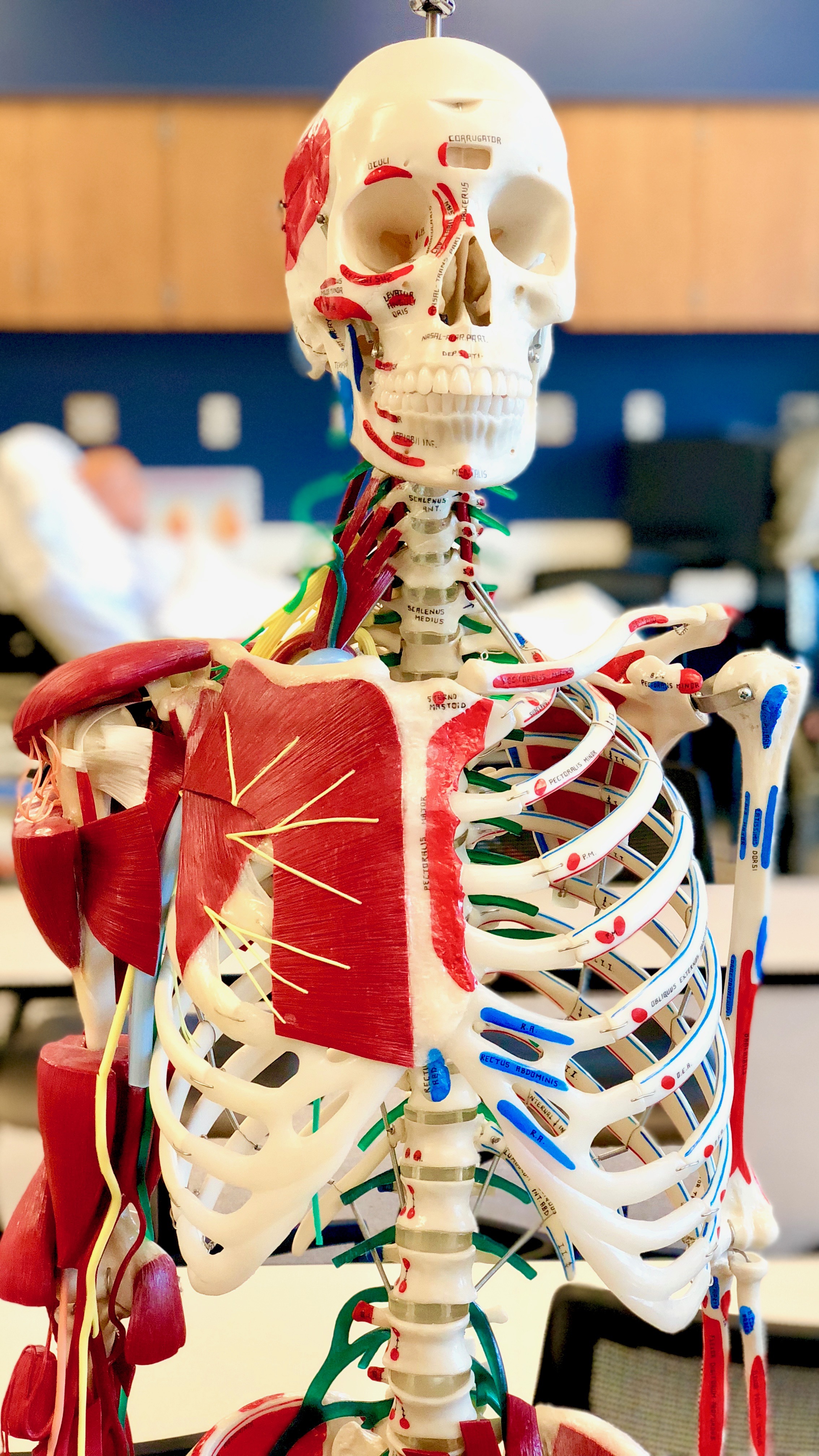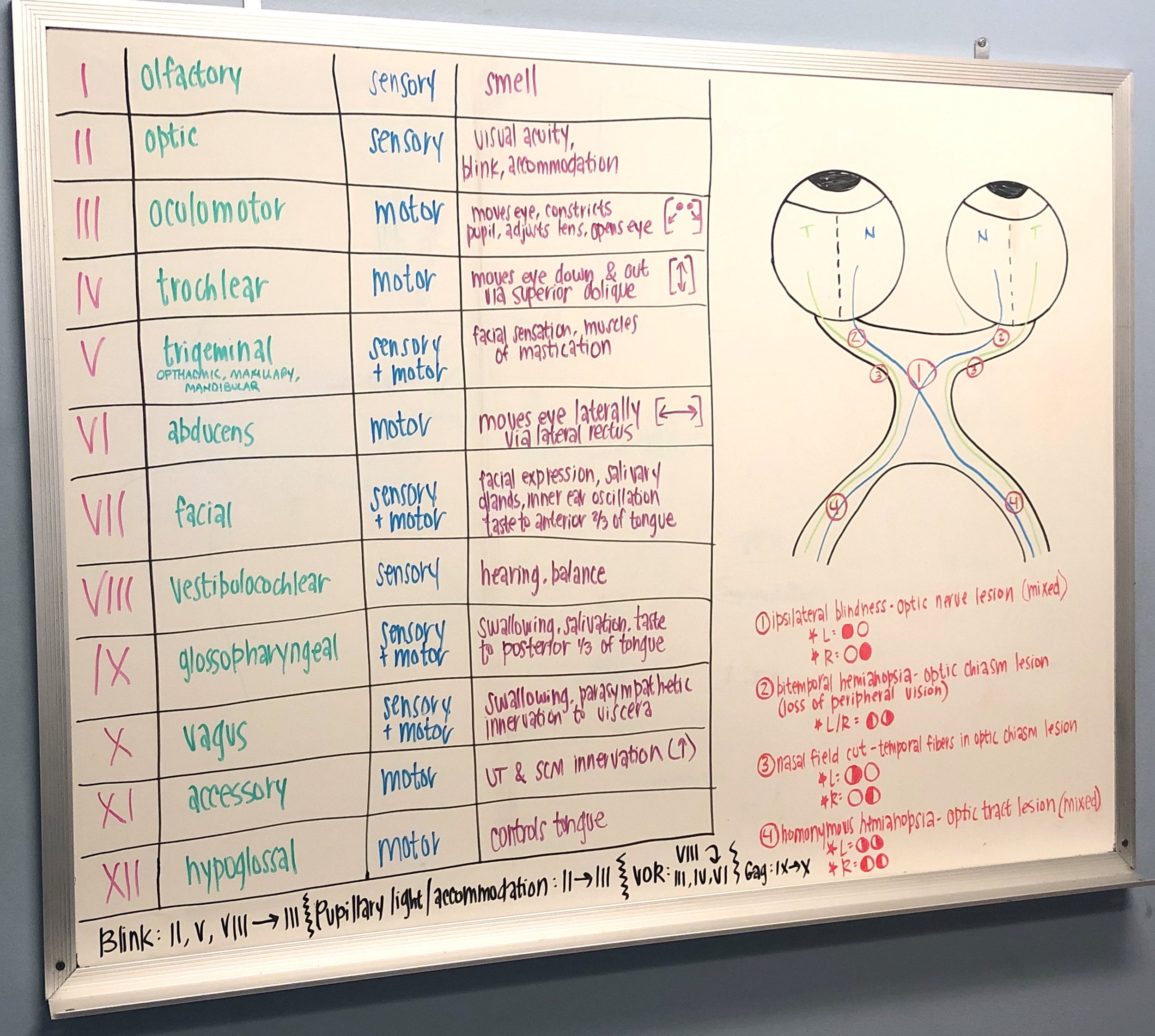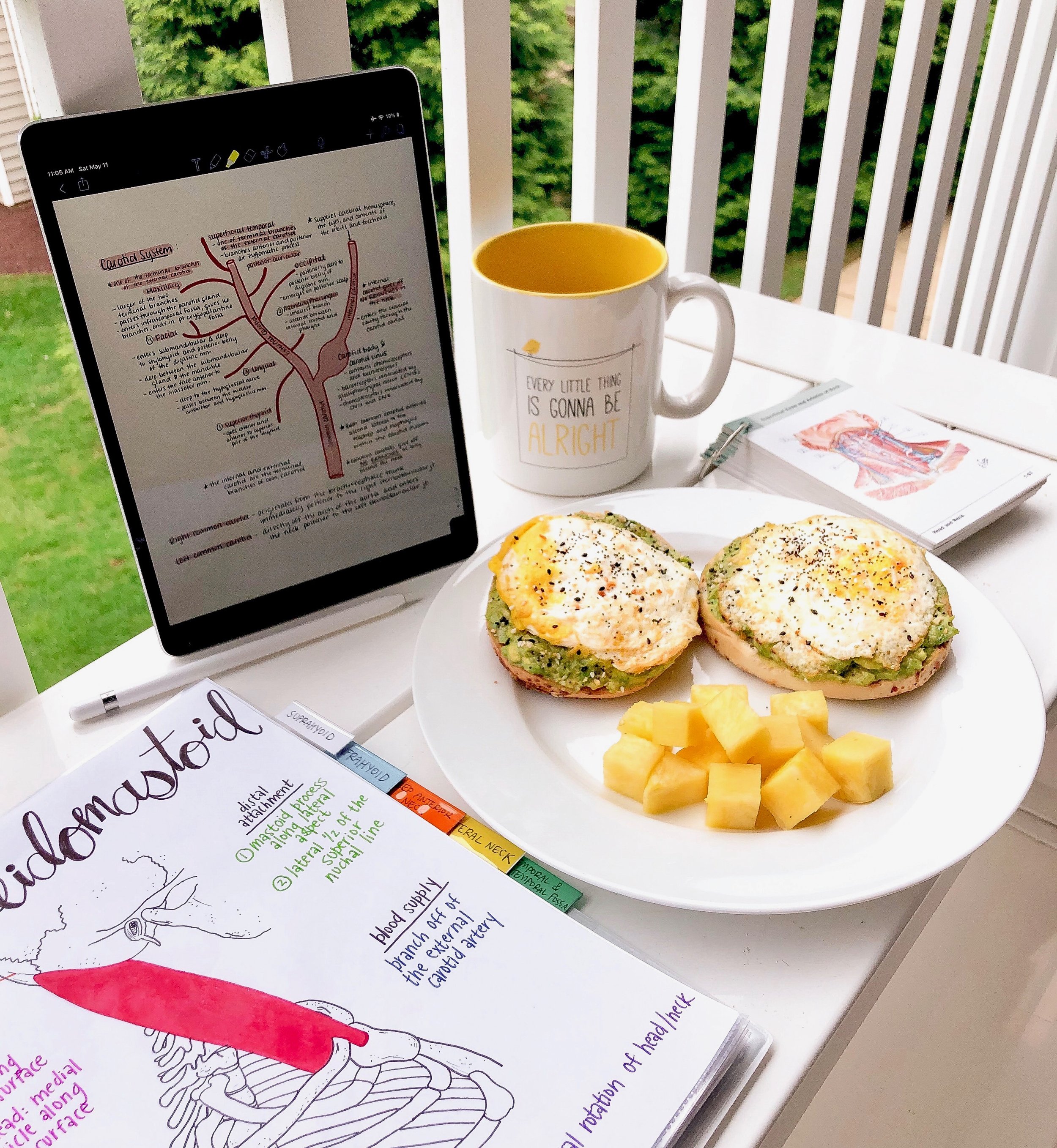Well, it’s official - I survived my first year of PT school!
There’s a lot of new subscribers here since I shared my last PT school-related post. So if you’re new here - welcome!! I know many of you are interested in my Muscular Anatomy 101 Drawings so let me start by saying if you have requested a PDF and have not received an email reply from me yet - I’m sorry! I get lots and lots of requests each day and I do my best to reply to each email, comment, and forum. However, I’ve got a full plate and the internet is a huge, busy place where unfortunately things sometimes fall through the cracks. Also, since many people have been wording their emails very similarly, many of them started automatically getting filtered to my spam - GAHHHH! I’ve been working with Gmail to get this problem fixed, and it should be all squared away now! So, if you would like a PDF of those drawings, you can either email me at breannaspainblog@gmail.com or submit a forum through my contact page :)
Alright now - back to business! So, hopefully you’ve taken a little bit of time to familiarize yourself with my PT school journey so far and have a little bit of a background story about how I got to where I am. If not, you can catch up by reading here and here!
I am currently pursuing my Doctor of Physical Therapy degree at Shenandoah University in Winchester, VA. I just finished my official first year and am so excited to be a rising second-year student in fall of 2019. This post is dedicated to sharing a general overview and recap of the classes I’ve completed and will be taking in future semesters, as well as a few highlights from the year. Stay tuned for more detailed posts on my first clinical experience, how I stay organized, personal study strategies, and more!
Schedule for My Completed Classes
Fall 2018:
- Clinical Conference I (completed in fall 2017 - kept previous grade)
- Evidence-Based Research Practice (completed in fall 2017 - kept previous grade)
- Examination and Intervention (completed in fall 2017 - audited)
- Gross Human Anatomy I & Dissection Lab (completed in fall 2017 - retook to stay fresh)
- Histological Aspects of Movement I (completed in fall 2017 - needed to retake)
- Medical Terminology and Documentation (completed in fall 2017 - kept previous grade)
- Professional Issues I (completed in fall 2017 - kept previous grade)
Spring 2019:
- Functional Neuroanatomy
- Gross Human Anatomy II & Dissection Lab
- Histological Aspects of Movement II
- Integrated Part-Time Clinical Experience I (my first clinical experience in outpatient ortho)
- Introduction to Therapeutic Intervention
- Medical Fundamentals
- Musculoskeletal System I
- Psychosocial Aspects of PT Practice I
Summer 2019:
- NADA! In my program, we get the full summer off after our first two semesters (fall and spring) from mid-May to the end of August. The next two summers will consist of our terminal full-time clinical experiences.
Schedule for My Future Classes
Fall 2019:
- Adult Neurotherapeutics
- Clinical Conference II
- Evidence-Based Practice I: Advanced Analysis
- Gait Analysis and Biomechanics
- Integrated Part-Time Clinical Experience II
- Musculoskeletal System II
- Pathology
- Therapeutic Interventions I
Spring 2020:
- Advanced Medical Fundamentals
- Evidence-Based Practice II: Advanced Analysis
- Integrated Part-Time Clinical Experience III
- Musculoskeletal System III
- Pediatric Physical Therapy
- Physical Agents
- Professional Issues II
- Therapeutic Interventions II
Summer 2020:
- Terminal Full-Time Clinical Internship I
Fall 2020:
- Advanced Topics
- Cardiovascular and Pulmonary Physical Therapy
- Clinical Conference III
- Evidence-Based Practice III: Advanced Criteria
- Professional Issues III
- Prosthetics and Orthotics
Spring 2021:
- Establishing a Physical Therapy Practice/Direct Access
- Terminal Full-Time Clinical Internship II
Summer 2021:
- Terminal Full-Time Clinical Internship III
Recap of My First Year
My Favorite Classes:
Gross Human Anatomy I and II and Functional Neuroanatomy.
Anatomy has my heart. Forever. I frickin love it. The body is so fascinating and some of my favorite things to learn about are how our muscles, nerves, blood vessels, and different organs work in such congruence to keep us alive and functional. Not everyone is a fan of cadaver lab because I mean come on… dead bodies. But I thought dissection was so beneficial and such an amazing learning tool to physically see, touch, and feel the things we were being taught. I also love, love, LOVE neuro! The brain is another thing that fascinates me and Functional Neuroanatomy was by far my favorite class in the spring. I am very intrigued by the neurological aspect of physical therapy and could definitely see myself working in this specialty primarily with patients with brain, spinal cord, and/or neuromuscular conditions. I’m excited to complete a future clinical rotation in this setting and get first-hand experience in this realm of the PT world.
My Least Favorite Classes:
Histological Aspects of Movement I and II.
Histology is the class that set me back - so as you can probably imagine, I have an ongoing love-hate relationship with it. I think the material that is taught in this classes is so interesting and I do really love learning about the histological foundation of how our systems work. However, the way they are taught is not ideal for my learning style. The material was taught in lecture with PowerPoints and the only other way we were assessed was through quizzes and exams. There was no lab component of the course, which I personally think would be very beneficial in helping reiterate this type of material even further. For instance, the cadaver lab component of Gross Human Anatomy I and II greatly helped me understand troubling concepts in these courses because if I didn’t understand something, I could could go into the lab and see it, touch it, feel it, move it, trace it through the body - make it make sense. The lab portion of my Musculoskeletal Systems I class was extremely helpful because as soon as we learned a concept or technique, we had the opportunity to practice practice practice that particular skillset until we became pros at it. In all of my other classes, we had labs, assignments, case studies, group work, online discussions, and guest speakers to help learn and understand the material. So, it took a lot more time and individual work for me understand the concepts taught in Histology.
My Strengths:
Organization.
I love being organized. It makes me super happy… in a pretty creepy way actually. I’m obsessed with planners and there’s so much in mine that it looks like a book. There’s just something about writing things down, having everything laid out, and checking things off lists that gives me such a crazy level of satisfaction. Next week I’ll be sharing a super detailed blog post on how I stay organized in PT school, so stay tuned for that!
Confidence.
You best believe I rocked all of my practicals because I walked in there with a sense of confidence that couldn’t be touched. I’m not a brilliant student but I am very confident about the things I do know. I love teaching people what I know and helping them understand things that don’t make sense to them.
Creativity.
Being a creative person has helped me be successful. I love being creative when it comes to learning new material and always try new ways to understand information, whether that be through drawings, charts, diagrams, building things, or acting stuff out. I can take something that’s being taught in class and modify its delivery in a way that makes it more fun, colorful, and easier to understand.
Productivity.
When I’m in the zone… there’s no stopping me. Is the building on fire? Okay great, the fire can work around my schedule… I’m not movin. Okay, obviously that’s an exaggeration but you get the point. I’m very efficient when it comes to checking things off of my to-do list and am a very routine kind of person. My study time is super productive and I always have a game plan in place. I still take breaks and check my phone every now and then and give in to the usual distractions from time to time. But when I have an end goal in mind or something to accomplish, nothing can get in my way of achieving it.
Caring… a lot.
I’m a very caring, positive, and encouraging person. Here’s a funny story - one day during the semester one of my best friends said to me, “I’m fu****** sick of you being so positive. Just let me be upset right now.” Haha I took it lightly and understood where she was coming from, but I’m someone who tries to keep negativity out of my life at all costs. I care so much about my classmates. My professors. The patients I worked with at the clinic. I’ll be the first person to ask you what’s wrong if you look down. I’ll always offer you a shoulder to cry on. I’ll always share my notes and take extra time to help you understand something from class that you just can’t seem to grasp. Being a caring person has helped me be happy and build meaningful relationships that will help me flourish as a physical therapist.
My Weaknesses:
Procrastinating.
If there was an award for being the most organized procrastinator in the world - I’m sure I would have it in the bag. I do this weird thing where I’m so organized to the point that I know the exact day and time that every single assignment is due and I can rattle off any date of an upcoming quiz, exam, or event. But I have trouble getting ahead and tend to wait until the last minute to actually meet deadlines. It’s kinda like because I know exactly when things are due and am on top of deadlines, I hold off as long as possible and prefer to work on short-term things before long-term things. Ugh. Need to fix this… ASAP.
Overthinking.
I have a problem with overthinking even the simplest of things and making them way more complicated than they have to be. I read into critique too much from my professors. I reread rubrics and edit my drafts a million times before I submit them because I’m scared I may be missing something or may have messed up somewhere. I drive myself crazy and need to learn to just chill TF out sometimes. Sheesh.
Public speaking.
I. Suck. At. Public. Speaking. I am a very extroverted, outgoing person but when it comes to speaking in front of an audience, I get SO nervous. I kinda panic on the inside. When I know I’m about to go next, my sympathetic nervous system goes into complete overdrive. Even if I’m speaking about a topic I’m an expert on and feel like I could write a book about because I know it so well, I still get super nervous. I get hot and sweaty, my voice is shaky, my eyes water, I forget things, and I awkwardly laugh at myself. It’s painful. Yikes… I’m workin’ on it, I’m workin’ on it.
Group work.
I’m a perfectionist and sometimes working in groups agitates me because certain things are out of my own control. I love group work in the sense that you get the opportunity to learn and grow from others’ ideas and knowledge. I know that with every group assignment or project, each member brings something valuable to the table that you wouldn’t be able to do otherwise - whether that be their sense of creativity, organization, precision, intuition, analytic abilities, didactic knowledge, hands-on skills, etc. However, group work tends to stress me out and I prefer to work individually if I have the choice.
Managing stress.
Stress gets the best of me sometimes and I don’t always handle it well. I’m someone that always tries my best to remain positive when the times get tough and find light even in the darkest of times. But sometimes it just ain’t easy. Towards the end of the spring semester, I was very, verrryyyyyy stressed. When I get stressed, I tend to isolate myself and not want to be around other people. I don’t want to leave my apartment, I cry, I sleep too much, and I tend to eat pretty badly (AKA too many late night Taco Bell dinners). One of the biggest goals I am setting for myself for the upcoming school year is working on this weakness and managing my stress better.
How I studied:
1. First, I imported the PowerPoint lecture into Notability and reviewed the PowerPoint before the material was taught in class.
2. Next, I created a study guide on Google Docs for that unit/chapter that included pictures and tables.
3. Then, I followed along in class as the lecture was taught with both the PowerPoint and my study guide. I would usually have the PowerPoint open on my iPad and record the audio of the lecture as I took notes directly onto the PowerPoint with my Apple Pencil. I would also have the study guide open on my laptop and add necessary notes to there, as well.
4. After class, I reviewed the material taught that day - especially the tougher concepts that I knew I needed to spend extra time on.
5. To help further strengthen my understanding of the material, I drew pictures, charts, and diagrams either on paper, on a dry erase board, or on my iPad.
6. Leading up to exams, I usually studied by myself and made sure I knew the material pretty well before I began to study with anyone else. Large study groups make me anxious and I am not a fan at all. After I feel comfortable with the material myself, I like to study in a small group of 2-3 other students to help reinforce the material. We would usually start with quiet studying to review the material, followed by talking out concepts, quizzing each other, or practicing skills (for the hands-on classes i.e. joint mobilizations).
The Most Memorable Things About the Year:
Classmates becoming family.
Hands-down, this is one of the best parts about the year. My classmates are my people. My tribe. My best friends. My family. There’s no way I could have made it to where I am right now if it wasn’t for them. The spring semester was really tough. Like really reaaaalllllyyyy tough. Sometimes I literally had no idea how I would make it through the week. But they were always there for me. We’re always there for each other. We’re not in competition with one another. We want to help each other succeed and be the best damn physical therapists the world has ever seen.
Completing my first clinical rotation.
This is where it all started to come-full circle. I realized this PT school stuff really meant something. It made sense why all of my stress and long hours of studying would pay off for something bigger than myself. I completed my first part-time clinical rotation this past spring and it was nothing short of amazing. I attended the clinic one day a week and spent the full day in the clinic with no classes on that day. It was nice to get a ‘break’ from the books for a day and be able to be present in real-world clinical scenarios. Working with physical therapists and patients was incredible. Hearing patients’ stories and getting to be a meaningful part of not only their health care, but their LIVES is a feeling I just can’t put into words. Stay tuned for a blog post with more details about my first clinical experience next week!
Realizing just how much I love physical therapy.
This field is challenging, but it’s the right one for me. I couldn’t see myself anywhere else doing anything but this. Physical therapists aren’t just physical therapists. They’re artists. Detectives. Problem solvers. Puzzle piecers. Being a part of this profession has caused me to push myself to new limits and grow immensely in so many important different aspects of life.
Realizing that grades really don’t matter all that much.
Grades matter, but not all that much. Crazy to think, right? We’ve been told our whole lives that grades are one of the most important things for us to focus on. We start taking honors classes as early as elementary and middle school. We took AP classes in high school to prepare us for college. We worked our butts off in college to have the best grades and scores that would get us in to the best graduate-level education programs. But once you’re here… once you’ve made it to PT school… grades are just a number. Of course, you need to pass and try to do your best in every class. But straight A’s just aren’t what’s important anymore. Being a well-rounded physical therapist that has the knowledge and skills to treat patients effectively is what’s important. The 4.0 GPA PT student who got a 100 on every exam may have poor communication skills and drive away patients because they’re disrespectful. The 3.0 GPA PT student who isn’t the brightest may need to reference resources more than the average person because they still don’t understand certain concepts as well, but know how to work well with a team and draw patients to their clinic because word around town is they’re an amazing, compassionate person. Every score won’t be perfect. Strive to do your best, but don’t beat yourself up because you didn’t get the grade you wanted. Be a stellar person and make up for it with other skills.
Having a life outside of PT school. No… I’m not joking. It IS possible.
I’m not lying. Your eyes are not playing tricks on you. You read that right. Adjusting to PT school during my first semester was pretty tough, but the second semester was much better and I promise that after you get into a good routine, balancing your school and social lives will totally be possible. I didn’t have a whole lot of free time. We had class from 8 AM to 5 PM during the week and exams on Mondays, so most weekends were spent studying for exams. However, I still had time to travel for volleyball tournaments (I’m an official), go on a few road trips, go downtown with my friends on Friday nights, have family and friends come visit, have dinner or game nights, volunteer in the community, and more. As you long as you stay organized and optimize your time, having a social life will 100% be achievable!
Thanks for reading and stay on the lookout for these upcoming posts!
7/30/19: My First Clinical Experience // Outpatient Orthopedics (With a Little Bit of Acute Care)
8/3/19: 7 Ways I Stay Organized in PT School






